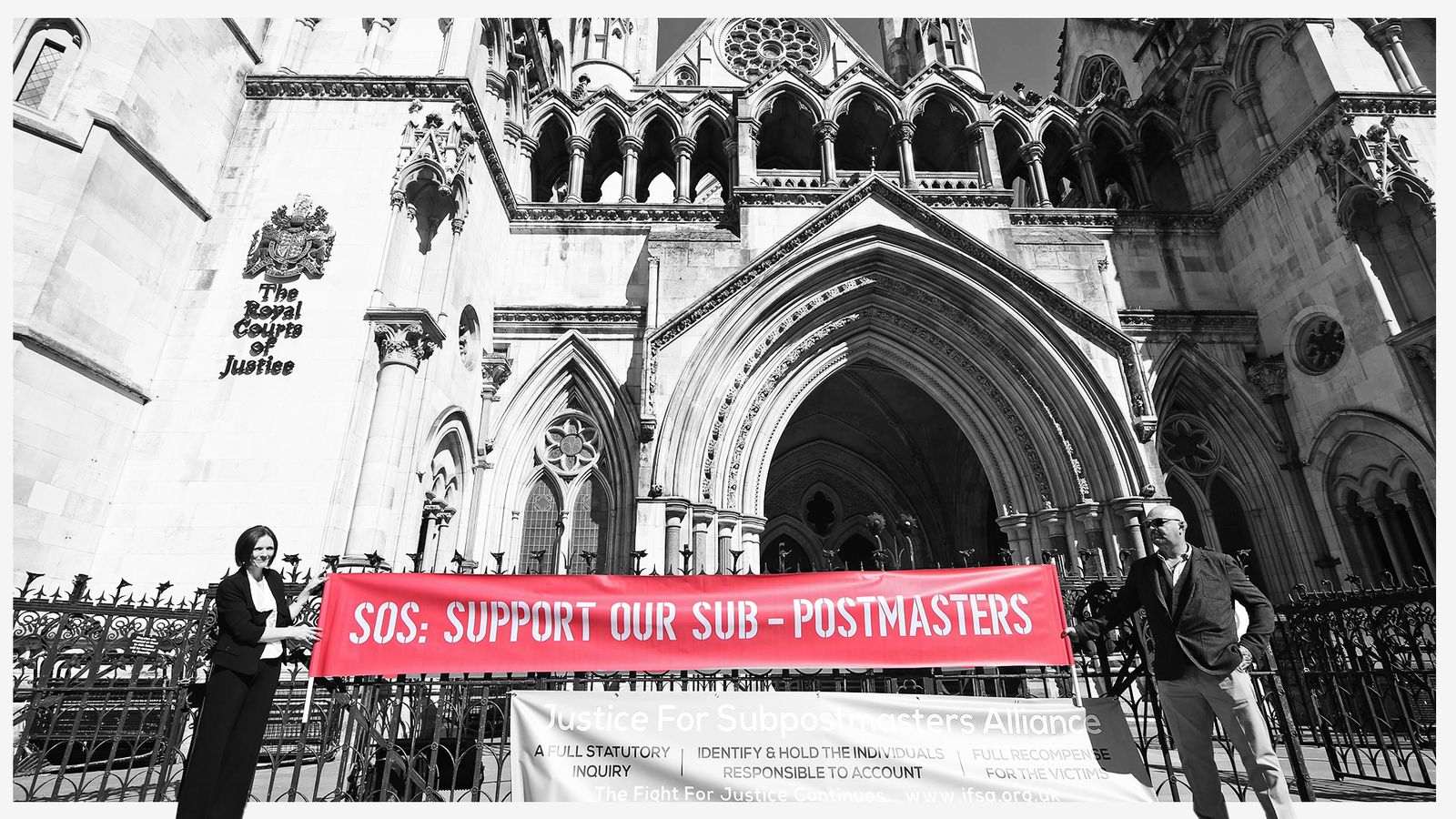A public inquiry has begun into how more than 700 Post Office workers were wrongly prosecuted for stealing company money – ruining their reputations and leaving many bankrupt and in prison.
The sub-postmasters and mistresses were falsely accused of theft and false accounting after a computer system called Horizon was introduced and incorrectly showed shortfalls on company accounts.
Many were found guilty and spent time in prison, but after years of campaigning, 72 have had their convictions quashed.
Read more: Tearful first Post Office victim contemplated suicide
In 2021 it was confirmed a statutory, independent inquiry would examine how the “worst miscarriage of justice in recent British legal history” happened.
As it gets under way this week, Sky News looks at the Horizon inquiry, the origins of the scandal and why justice has taken so long.
What is Horizon and how did it trigger a scandal?
Baby and woman, 35, die in early hours collision with HGV in Shropshire
COVID news live: Omicron infection does not protect against other variants, study shows
Coronavirus: Long COVID less common in fully vaccinated, UK health agency says
The Post Office introduced a new IT system called Horizon, made by the Japanese company Fujitsu, across the country in 1999.
It was used to manage transactions, accounts and stocktaking.
Sub-postmasters and mistresses – the staff in charge of branches – soon began noticing shortfalls in company accounts and complained the system was faulty.
Please use Chrome browser for a more accessible video player
No action was taken by the Post Office so cash shortages of several thousand pounds continued to appear on the accounts of branches nationwide.
Some workers were so concerned they used their own money to balance the books.
In 2000, the Post Office began taking legal action against sub-postmasters using Horizon data as evidence. By 2014, 736 had been criminally prosecuted.
What happened to the sub-postmasters?
Summarising how the miscarriage of justice has affected its victims, Jason Beer QC, counsel to the public inquiry, said: “Lives were ruined, families were torn apart, families were made homeless and destitute.
“Reputations were destroyed, not least because the crimes of which the men and women were convicted all involved acting dishonestly.
“People who were important, respected and integral part of the local communities that they served were in some cases shunned.
“A number of men and women sadly died before the state publicly recognised that they were wrongly convicted.”
Read more: Depression, bankruptcy and jail – why we sued the Post Office
Please use Chrome browser for a more accessible video player
On the first day of the inquiry, one victim said he would have taken his own life if it wasn’t for his family.
Baljit Sethi, 69, ran a post office near Romford, Essex, for 22 years until he was sacked over account shortfalls.
“I was down and out, I contemplated suicide, but I thought no, that’s the easy way out, what about my family and my children?,” he told the hearing.
“People in our community believed we had been robbing from the Post Office.”
Seema Misra was found guilty of stealing £75,000 from the post office she ran in West Byfleet, Surrey.
She was jailed on her son’s 10th birthday and told Sky News she only resisted suicide because she was pregnant with another child.
“We had been trying for another baby for seven or eight years so it should have been the happiest moment for us. Instead, prison was the worst experience of my life,” she said.
Other victims have told of marriages breaking down, losing their homes and developing chronic illnesses and addictions.
When did things change?
The sub-postmasters and their supporters have campaigned against their convictions from the beginning.
Several of them sued the Post Office and when the series of lengthy civil cases came to an end in December 2019, the company agreed to settle with 555 victims.
They agreed on £58m in damages, of which the claimants shared £12m, after legal fees.
Days later a High Court judgment ruled that the Horizon IT system was not fit for purpose and there was a “material risk” of shortfalls appearing on accounts due to “bugs, errors and defects”.
This paved the way for the victims’ convictions to be reconsidered via the Criminal Cases Review Commission.
By the end of 2021, 72 sub-postmasters and mistresses were cleared of any wrongdoing and their criminal records wiped.
This included a landmark hearing in April when 39 convictions were quashed in one go, in which the judge ruled the original verdicts were an “affront to the public conscience”.
This means the postmasters may be legally entitled to sue the Post Office for malicious prosecution and receive further damages.
Why is there an inquiry and what will it look at?
Following the High Court ruling, in February 2020 Prime Minister Boris Johnson promised to hold an independent inquiry into the scandal.
In May 2021, after the 39 convictions were quashed by the Court of Appeal, he announced it would be given statutory status, meaning witnesses can be forced to give evidence.
“We must stand with the postmasters and get to the bottom of what went wrong in the Post Office Horizon IT dispute,” he said.
“We’re stepping up our independent inquiry by putting it on a statutory footing, so we can get the answers they deserve.”
According to the terms of reference, its aim is to “establish a clear account of the failings of the Horizon IT computer system and assess whether lessons have been learnt at the Post Office”.
It will therefore consider whether the company knew about the faulty system and how staff bore the burden.
The Justice for Sub-postmasters Alliance group, which played a key part in the High Court battle, is refusing to take part in the inquiry, however, claiming it will slow down the justice process and any compensation payments.
It is being held at the International Dispute Resolution Centre in central London and being chaired by Sir Wyn Williams.
What could happen next?
The government has agreed to pay £100,000 in compensation to the wrongly-convicted postmasters.
These will only be interim payments and victims will be entitled to seek further damages through civil lawsuits or out-of-court settlements, which could run into the millions.
More than 2,400 people are believed to have applied for compensation.
Meanwhile the Post Office has said it will co-operate fully with the public inquiry, which is due to deliver its findings in the autumn.
The High Court ruling saw the judge promise to refer Fujitsu to the Director for Public Prosecutions for possible further legal action.






















